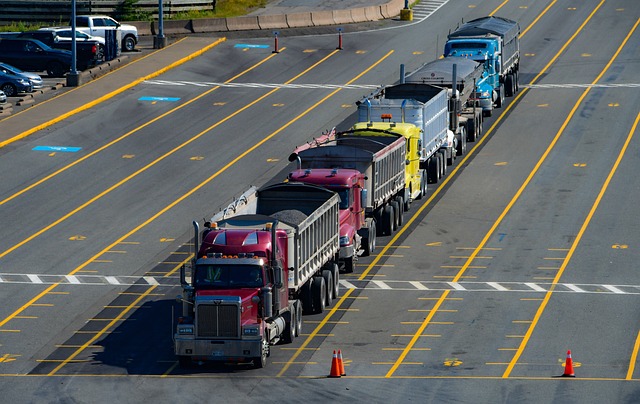The trucking industry is integral to the supply chain, requiring reliable trucks and comprehensive insurance to manage risks such as accidents, theft, and natural disasters. Essential truck insurance covers liability, physical damage including collision and comprehensive, and offers additional protections like contingent coverage for trailers and cargo, as well as uninsured/underinsured motorist coverage. Factors influencing insurance premiums include the driver's experience, vehicle age, maintenance, cargo value, and route specifics, with high-risk locations demanding higher rates. Trucking businesses can optimize their insurance costs by comparing quotes from specialized insurers, considering higher deductibles, maintaining a clean driving record, and implementing advanced safety technologies. Regular policy audits ensure coverage remains appropriate for the fleet's current needs, allowing truckers to balance financial efficiency with adequate protection. By adopting these strategies, the trucking industry can secure competitive insurance rates while ensuring operational resilience and compliance with industry standards.
Protecting your livelihood on the road demands more than just a sturdy vehicle—it requires robust truck insurance tailored to the unique challenges of the trucking industry. Our comprehensive guide delves into the essentials of safeguarding your income, from understanding the necessity of comprehensive truck insurance for business resilience, to key coverage elements that form a shield against unforeseen events. We also navigate the impact of risk factors on insurance rates and offer strategic insights to help you minimize costs without compromising on the protection your fleet needs. Secure your operation’s future with informed decisions in trucking insurance.
- Understanding the Necessity of Comprehensive Truck Insurance for Your Business Operations
- Key Coverage Elements to Look for in Quality Truck Insurance Policies
- Assessing Risk Factors and How They Impact Your Truck Insurance Rates
- Strategies to Minimize Insurance Costs While Maximizing Protection for Your Fleet
Understanding the Necessity of Comprehensive Truck Insurance for Your Business Operations

In the realm of commercial transportation, the truck and trucking industries are pivotal to the supply chain, ensuring that goods reach their destinations safely and on time. As such, the operational integrity of a trucking business is not solely dependent on its fleet’s mechanical reliability but also on robust insurance coverage. Comprehensive truck insurance serves as a critical safeguard against unforeseen events that could disrupt your business operations, such as accidents, theft, or natural disasters. It encompasses a range of protections tailored to the unique exposures faced by truckers, including liability coverage for third-party claims and physical damage coverage for your own trucks. Investing in this insurance not only complies with legal requirements but also protects your financial stability, allowing you to operate with confidence knowing that you are prepared for a wide array of potential risks.
The importance of comprehensive truck insurance extends beyond mere compliance; it’s a strategic investment in the resilience and longevity of your trucking business. This insurance covers various aspects, from the cargo you carry to the drivers who operate your vehicles. It includes options for coverage against collisions, cargo loss or damage, as well as liability for bodily injury or property damage caused by your trucks. By securing this insurance, you ensure that any incident won’t lead to catastrophic financial losses, which could otherwise jeopardize the continuity of your operations and the trust your clients place in you. In essence, comprehensive truck insurance is an indispensable tool for maintaining the health and viability of your business within the competitive trucking industry.
Key Coverage Elements to Look for in Quality Truck Insurance Policies

When securing quality truck insurance for your commercial operations, it’s crucial to understand the key coverage elements that will safeguard your income and assets effectively. Comprehensive coverage should include liability protection, which addresses bodily injury or property damage caused by your truck. This aspect is particularly important as it ensures financial stability in the event of unforeseen accidents involving third parties. Additionally, look for physical damage coverage that encompasses both collision and comprehensive options. Collision covers repairs or replacement if your truck is involved in an accident with another vehicle or object, while comprehensive coverage protects against non-collision events like theft, vandalism, or natural disasters. Furthermore, consider the importance of contingent coverage, which can extend protection to trailers and cargo under certain conditions, providing a robust safety net for your trucking business’s continuous operation. Adequate uninsured/underinsured motorist coverage is also essential, as it offers protection when the at-fault party lacks adequate insurance to cover damages. In the trucking industry, where the risks are as diverse as the cargo carried, a comprehensive policy that addresses these elements is indispensable for maintaining your business’s financial health and ensuring peace of mind on the road.
Assessing Risk Factors and How They Impact Your Truck Insurance Rates

When considering truck insurance, it’s crucial to evaluate various risk factors that can influence your premium rates. Owner-operators and trucking companies must understand that insurers assess the likelihood of claims based on a multitude of elements. These factors include the driver’s experience, driving record, the age and condition of the truck, cargo value, and the routes typically traveled. High-risk areas with higher incidences of theft, accidents, or severe weather conditions can also elevate insurance costs. By comprehensively assessing these risks, insurers can tailor coverage to mitigate potential losses, offering peace of mind and financial protection for those in the trucking industry. It’s prudent to engage with insurance providers who specialize in commercial vehicle policies to ensure that your coverage aligns with your specific operational risks and to secure competitive rates in the trucking insurance market. Regularly reviewing and updating your insurance policy can help you maintain optimal protection levels commensurate with the dynamic nature of the trucking industry.
Strategies to Minimize Insurance Costs While Maximizing Protection for Your Fleet

Operators in the trucking sector can implement several strategies to minimize insurance costs while maintaining comprehensive coverage for their fleets. Firstly, it’s advisable to shop around and compare quotes from multiple insurers to find the most competitive rates. This competitive quoting process allows fleet owners to gauge which carriers offer the best value for the level of protection provided. Secondly, opting for higher deductibles can significantly reduce premium costs without compromising on essential coverage. This approach transfers a portion of the risk to the insured, thereby lowering the insurer’s liability and reflecting in lower monthly payments. Additionally, maintaining a good driving record is crucial; safe drivers pose less risk, which translates to better insurance rates. Investing in advanced safety features for your trucks also demonstrates a commitment to risk mitigation, often leading to preferential rates from insurers recognizing these proactive measures. Regularly reviewing and updating your policy to reflect any changes in fleet size or usage patterns ensures that you’re not overpaying for coverage that doesn’t align with your current operations. By carefully considering these strategies and implementing them, trucking businesses can effectively safeguard their income while optimizing their insurance expenditures.
In conclusion, safeguarding your income in the trucking industry hinges on securing robust insurance coverage tailored to the unique risks associated with this line of work. By comprehending the critical nature of comprehensive truck insurance and identifying the key coverage elements within quality policies, you can effectively manage your business’s exposure to potential losses. Carefully assess risk factors that influence your insurance rates, and implement strategic measures to minimize costs without compromising on the protection your fleet requires. With diligent planning and informed decision-making, you can ensure your operations remain resilient against unforeseen events, keeping your business—and your income—on the road to success.
